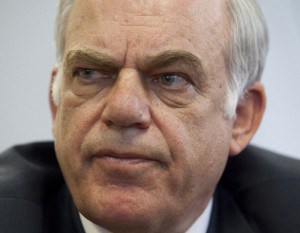Konrad von Finckenstein, the head of Canada’s telecommunications regulator who initially rubber-stamped a Bell proposal to force Internet providers in Canada to charge usage-based pricing will not be back for a second term.
Von Finckenstein broke the news himself in a memo sent to staff at the Canadian Radio-television and Telecommunications Commission, stating he would end his leadership of the CRTC when his five-year term concludes in January.
The CRTC has made uncomfortable headlines for Canada’s Conservative government, primarily by approving an Internet pricing plan submitted by Bell that would require virtually every Internet provider in Canada to end unlimited, flat rate pricing for broadband service.
The CRTC is hardly a hotbed of headline news for most Canadians. The sleepy agency regulates telephone, broadband, television, and radio in the country with an increasingly light touch. Ten years ago, the CRTC was regularly accused by some broadcasters of meddling in their private business. These days the Commission, packed with members who formerly worked for the companies they now oversee, has gotten considerably more friendly with those they regulate.
That policy blew up in their faces when Bell got most of what it wanted in a wholesale pricing change that was so wide-reaching, it would potentially impact every Canadian Internet user. Nearly a half-million of them registered their displeasure in a petition sponsored by Openmedia.ca.
Von Finckenstein’s resolute attitude towards the correctness of that decision was soon tempered when Industry Minister Tony Clement found himself overruling the CRTC in a Twitter message, telling Canadians the decision to impose usage-based billing “would not be allowed to stand.”
Opposition members in Parliament had a field day over Clement’s repeated distancing of the government from CRTC policies, particularly the one involving Internet pricing.
Liberal MP Marc Garneau seized on the fact Clement tweeted his intentions to the public at large before sharing them with von Finckenstein himself. That, Garneau claimed, was the latest example of the government’s lack of clear policy on issues such as usage-based billing that has left the CRTC in what he called a “giant policy vacuum.”
The announcement by the CRTC chairman comes at the same time the Commission is finalizing a re-evaluation of its earlier decision on usage-based billing.
While hundreds of thousands of Canadians upset with the CRTC may be glad to see the back of von Finckenstein, his colleagues were considerably more generous with their praise:
Former CRTC executive Richard French credits Von Finckenstein, saying he sped up the commission’s decisions, improved the atmosphere around the offices and rarely left anyone guessing what he thought, “which I think is a virtue in a regulator.”
“He balanced the desire for more market forces with a recognition that for most of the industries in question, the Canadian market is sub-economic, it’s just not big enough to sustain enough players in this capital intensive business to create real competition so regulation is required,” French said Monday.
“He’s done an excellent job and he deserves the respect and appreciation of the industry and of the population,” French said.
Heritage Minister James Moore’s office issued a statement thanking von Finckenstein for his service as CRTC chair and said a process to select a new chair would be announced in the coming weeks.


 Subscribe
Subscribe
